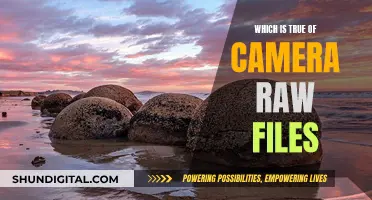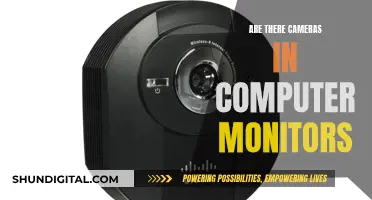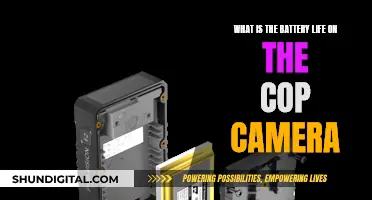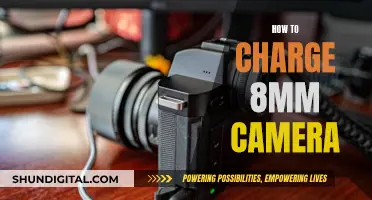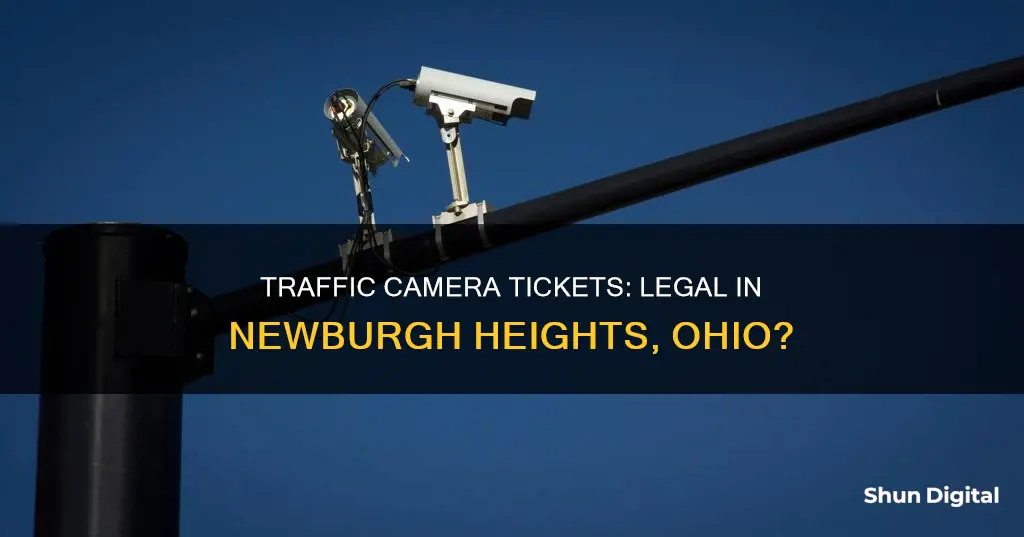
Traffic cameras in Newburgh Heights, Ohio, have been a contentious issue. While the Ohio Supreme Court ruled in 2017 that an officer need not be present at traffic camera locations, a 2022 ruling gave state lawmakers the right to withhold state money from towns making money from speed cameras. This prompted Newburgh Heights to pause its traffic camera enforcement program, which had been issuing tens of thousands of tickets annually. While traffic cameras are still legal in Newburgh Heights, the village turned off its cameras while it reviews the ruling and its impact.
| Characteristics | Values |
|---|---|
| Are traffic camera tickets legal in Newburgh Heights, Ohio? | Yes, as of 2024. |
| Are there any ongoing disputes regarding the legality of traffic camera tickets in Newburgh Heights, Ohio? | In 2022, the Ohio Supreme Court ruled that the General Assembly can reduce a municipality's state funding by the amount of income generated by its traffic camera program. Following this, Newburgh Heights paused its traffic camera enforcement program. |
| What are the consequences of a traffic camera citation in Newburgh Heights, Ohio? | Traffic camera violations carry a civil penalty in the form of a monetary fine. There will be no conviction and no points on the driving record. |
| What are the options for individuals who receive a traffic camera citation in Newburgh Heights, Ohio? | Individuals have the choice to pay the fine, file a request for time to pay the fine, file a transfer of liability form if they were not the driver or if their vehicle/license plates were stolen, or file a request for a hearing to contest the citation. |
What You'll Learn
- The Ohio Supreme Court ruled that traffic cameras are legal
- Newburgh Heights paused its speed camera program in 2022
- Traffic camera violations carry a civil penalty and no points on your license
- The Newburgh Heights Police Department is compliant with all Ohio law pertaining to photo traffic enforcement
- Newburgh Heights has a population of fewer than 2,000 people and collected over $2.4 million in traffic camera revenue in 2018

The Ohio Supreme Court ruled that traffic cameras are legal
In 2022, the Ohio Supreme Court ruled that traffic cameras are legal in the state of Ohio. This ruling came about as a result of a lawsuit filed by the village of Newburgh Heights and the city of East Cleveland, which challenged a 2019 state law that set financial disincentives for local governments to use cameras for issuing traffic citations. The law in question allows the state to deduct from its funding to municipalities an amount equal to the fines collected by the municipalities through traffic-camera citations.
The Ohio Supreme Court's ruling stated that while municipalities have the right to self-govern and can obtain revenue through traffic-camera fines, the state is also within its rights to reduce its funding to these municipalities based on the amount they receive from such fines. In other words, the court recognised the validity of a "spending setoff", which lowers the state funding received by municipalities that use traffic cameras, creating a financial disincentive for their use.
The court also upheld the requirement that municipalities using traffic cameras must pay an advance deposit to cover court costs and fees for traffic violations charged through the use of cameras. This ruling was based on the understanding that while the deposit requirement may make litigating violations more expensive for municipalities, it does not prohibit or conflict with their right to use cameras to enforce their traffic laws.
It is important to note that the Ohio Supreme Court's rulings on this matter have evolved over time. In 2017, the court struck down a 2015 law that required a police officer to be stationed alongside every camera in operation, effectively banning traffic cameras. However, the more recent ruling in 2022 upheld the state's power to financially discourage the use of traffic cameras by municipalities, while still recognising their legality.
Understanding the Creative Power of TV Mode on Your Camera
You may want to see also

Newburgh Heights paused its speed camera program in 2022
In May 2022, Newburgh Heights, Ohio, paused its speed camera program following a ruling by the Ohio Supreme Court. The ruling stated that state lawmakers could withhold state funding from towns that made money from speed cameras. The village of Newburgh Heights had sued the state of Ohio, arguing that the laws restricting the use of photo enforcement by communities were unconstitutional.
Newburgh Heights' speed camera program had been controversial, with the village developing a reputation for issuing tens of thousands of tickets, many of them from an officer with a camera standing along Interstate 77. The village, which has a population of fewer than 2,000 people, collected more than $2.4 million in traffic camera revenue in 2018, issuing tickets to vehicles traveling at least 12 miles per hour over the speed limit.
The mayor of Newburgh Heights, Gigi Traore, stated that the village would comply with the ruling and that it was not clear what the financial impact would be if police continued to issue speed camera tickets but lawmakers withheld funding. The village's counsel, Michael Cicero, argued that the laws were an "indirect attempt by the legislature to dictate the minutia and make it economically unviable or impossible or imprudent to run any traffic camera program."
While the Ohio Supreme Court ruling impacted revenue generated from standalone, stationary traffic cameras, it did not affect revenue from police officers monitoring speed. The court also affirmed that traffic cameras do not violate any person's constitutional rights and that an officer does not need to be present for a citation to be issued.
iPad Night Mode Camera: Does It Exist?
You may want to see also

Traffic camera violations carry a civil penalty and no points on your license
Traffic camera violations in Newburgh Heights, Ohio, carry a civil penalty and no points on your license. This means that if you are caught speeding by a traffic camera in Newburgh Heights, you will not receive any points on your driving record, and the violation will not result in a criminal conviction. Instead, you will be subject to a monetary fine, which must be paid online, by phone, by mail, or in person.
It's important to note that traffic camera enforcement programs have been a subject of debate in Ohio, with some communities banning their use. However, the Village of Newburgh Heights operates a photo traffic enforcement program that includes automated traffic cameras and officer-operated handheld units. The program is compliant with all Ohio laws pertaining to photo traffic enforcement.
If you receive a traffic camera citation in Newburgh Heights, you have several options to resolve it:
- Pay the fine: You can pay the fine using the provided payment methods. Paying the fine will resolve the matter, and you will not have any points or a conviction on your driving record.
- Request time to pay: If you need more time to pay the fine, you can file a Motion for Time to Pay. There is a $15 filing fee for this request, and it must be made within 30 days of receiving the Notice of Liability.
- Transfer liability: If someone else was driving your vehicle, you can file a Transfer of Liability Form within 30 days of receiving the Notice of Liability. This form must include the name and address of the driver, and it needs to be signed in front of a notary or court deputy clerk.
- Contest the citation: If you disagree with the citation, you can file a Request for Hearing Form with the Clerk within 30 days of receiving the ticket. Failing to request a hearing within this timeframe will result in admitting liability.
It's worth noting that traffic camera citations are generally considered non-moving infractions, similar to parking tickets. While they don't carry points or affect your insurance rates, failing to pay past-due tickets can result in consequences such as a hold on your registration renewal or booting of your vehicle.
Leica Cameras: Where Are These Premium Devices Manufactured?
You may want to see also

The Newburgh Heights Police Department is compliant with all Ohio law pertaining to photo traffic enforcement
The Newburgh Heights Police Department also uses the Dragon Cam for photo enforcement of civil speeding violations. This is a standard LIDAR unit with an affixed camera that captures photos of speeding motorists. This unit can be operated by a peace officer in any speed limit zone.
The Village of Newburgh Heights has posted fixed signs throughout the village to advise motorists of the photo enforcement program and speed limits. The use of these signs is in accordance with the law, ensuring that motorists are aware of the presence of photo enforcement.
In terms of legal standing, the Ohio Supreme Court has affirmed the legality of traffic cameras in the state. While there was a challenge to the use of traffic cameras in 2022, the Court ruled that the General Assembly could reduce a municipality's state funding by the income generated from traffic camera programs. This ruling prompted Newburgh Heights to pause its traffic camera enforcement program while reviewing the ruling's impact. However, at no point was the use of traffic cameras deemed illegal, and the cameras remain legal in Ohio.
The Newburgh Heights Police Department's use of photo traffic enforcement is, therefore, compliant with all relevant Ohio laws and regulations. The department follows the required procedures for signage, calibration, and notification, ensuring that motorists' rights are respected while also enforcing traffic laws.
Olympus Cameras: Made in Japan?
You may want to see also

Newburgh Heights has a population of fewer than 2,000 people and collected over $2.4 million in traffic camera revenue in 2018
In 2022, Newburgh Heights, Ohio, paused its traffic camera enforcement program following an Ohio Supreme Court ruling. The ruling stated that the General Assembly could reduce a municipality's state funding by the amount of income generated by its traffic camera program.
Newburgh Heights, a village with a population of fewer than 2,000 people, collected over $2.4 million in traffic camera revenue in 2018. The village had a reputation for issuing tens of thousands of tickets annually, primarily from an officer with a camera stationed along Interstate 77. The cameras were installed in 2015, and the program began in 2014.
The traffic camera enforcement program in Newburgh Heights was controversial. The village and the city of East Cleveland sued the state of Ohio, arguing that the laws were unconstitutional. They specifically challenged House Bill 62, a 2019 state transportation budget that restricted how communities use photo enforcement.
While the Ohio Supreme Court upheld the use of traffic cameras, it affirmed the General Assembly's power to decide how to allocate state funding. Following the ruling, the mayor of Newburgh Heights stated that the village would comply with the decision, and the traffic enforcement cameras were turned off. It is unclear if or when they will be reinstated.
Charging Camera Batteries: Alone Show Secrets Revealed
You may want to see also
Frequently asked questions
No, the Ohio Supreme Court ruled on how traffic camera violations are adjudicated in court and how they impact local government funding. Traffic cameras are still legal in Ohio.
In certain cities, traffic cameras have been banned by a vote from that community. This does not apply to Newburgh Heights.
No, the Ohio Supreme Court stated that the cameras do not violate any person's Constitutional rights.
No, effective July 26, 2017, the Ohio Supreme Court has ruled that an officer need not be present.
Yes, you can contest a photo enforcement citation by visiting the Garfield Heights Municipal Court website or calling 216-475-1900 between 8:00 a.m. and 4:00 p.m. EST.


